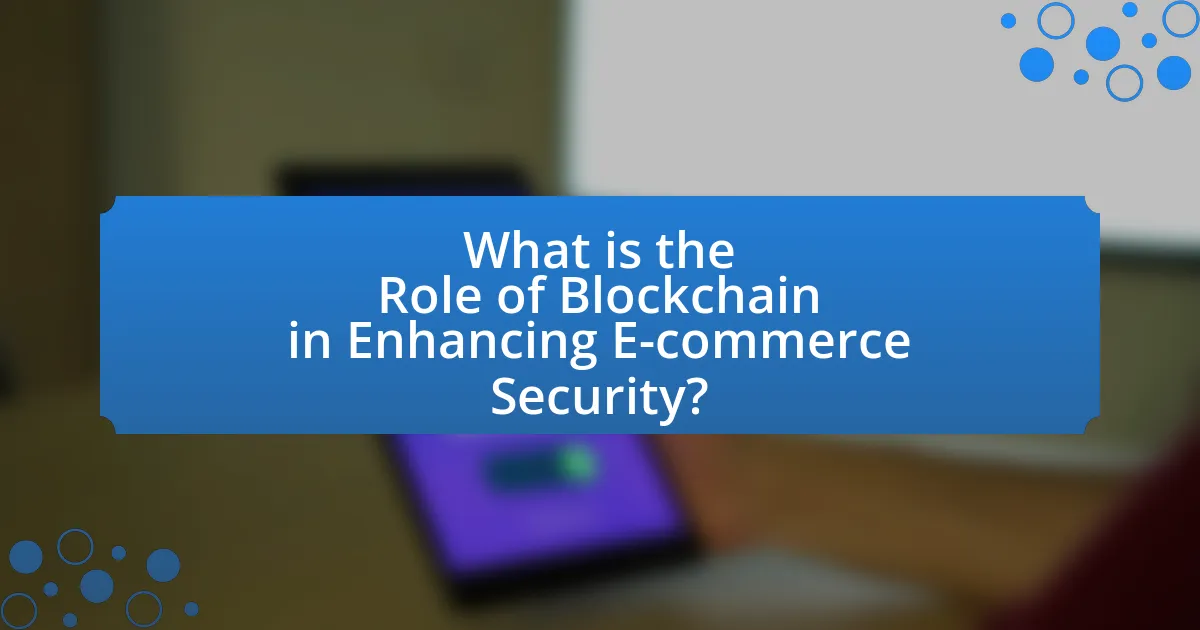The article focuses on the role of blockchain technology in enhancing e-commerce security. It outlines how blockchain provides a decentralized and immutable ledger that ensures transparency and trust in online transactions, significantly reducing the risk of fraud and data breaches. Key features such as decentralization, immutability, and cryptographic hashing are discussed, along with the impact of smart contracts on automating agreements and improving compliance. The article also addresses common security threats faced by e-commerce platforms, the importance of robust security measures, and the future trends in blockchain technology that could further enhance security in e-commerce.

What is the Role of Blockchain in Enhancing E-commerce Security?
Blockchain enhances e-commerce security by providing a decentralized and immutable ledger that ensures transparency and trust in transactions. This technology allows for secure peer-to-peer transactions without the need for intermediaries, reducing the risk of fraud and data breaches. For instance, blockchain’s cryptographic techniques protect sensitive customer information, making it difficult for unauthorized parties to access or alter transaction data. Additionally, smart contracts automate and enforce agreements, minimizing human error and enhancing compliance with security protocols. According to a report by the World Economic Forum, blockchain can reduce fraud in e-commerce by up to 80%, demonstrating its significant impact on improving security in online transactions.
How does blockchain technology contribute to e-commerce security?
Blockchain technology enhances e-commerce security by providing a decentralized and immutable ledger for transactions. This decentralization reduces the risk of data breaches, as there is no single point of failure, making it difficult for hackers to manipulate transaction data. Additionally, the immutability of blockchain ensures that once a transaction is recorded, it cannot be altered or deleted, which protects against fraud and unauthorized changes. According to a report by the World Economic Forum, blockchain can reduce fraud in e-commerce by up to 50% by ensuring transparency and traceability of transactions.
What are the key features of blockchain that enhance security?
The key features of blockchain that enhance security include decentralization, immutability, and cryptographic hashing. Decentralization reduces the risk of a single point of failure, as data is distributed across a network of nodes, making it difficult for malicious actors to alter or corrupt the information. Immutability ensures that once data is recorded on the blockchain, it cannot be changed or deleted, which protects against fraud and unauthorized modifications. Cryptographic hashing secures data by converting it into a fixed-size string of characters, making it nearly impossible to reverse-engineer or tamper with the original information. These features collectively create a robust security framework that is particularly beneficial for e-commerce transactions, where trust and data integrity are paramount.
How does decentralization in blockchain improve trust in e-commerce?
Decentralization in blockchain improves trust in e-commerce by eliminating the need for a central authority, which reduces the risk of fraud and manipulation. In a decentralized system, transactions are recorded on a public ledger that is accessible to all participants, ensuring transparency and accountability. This transparency allows consumers to verify the authenticity of products and the integrity of sellers, as each transaction is immutable and traceable. For instance, a study by the World Economic Forum highlights that blockchain can reduce fraud in supply chains by up to 50%, thereby enhancing consumer confidence in e-commerce transactions.
Why is security a critical concern in e-commerce?
Security is a critical concern in e-commerce because it protects sensitive customer information and financial transactions from cyber threats. The rise in online shopping has led to increased incidents of data breaches, with a report from IBM indicating that the average cost of a data breach in 2021 was $4.24 million. This financial impact underscores the necessity for robust security measures to safeguard personal data, such as credit card numbers and addresses, which are prime targets for hackers. Additionally, a survey by Statista revealed that 43% of consumers would stop shopping with a retailer after a data breach, highlighting the reputational damage that can occur. Therefore, ensuring security in e-commerce is essential for maintaining customer trust and business viability.
What are the common security threats faced by e-commerce platforms?
E-commerce platforms commonly face security threats such as data breaches, payment fraud, phishing attacks, and Distributed Denial of Service (DDoS) attacks. Data breaches occur when unauthorized individuals access sensitive customer information, leading to identity theft and financial loss; for instance, the 2017 Equifax breach exposed personal data of 147 million people. Payment fraud involves the use of stolen credit card information to make unauthorized purchases, which has been a significant issue, with the global cost of online payment fraud projected to reach $48 billion by 2023. Phishing attacks trick users into providing personal information through fake emails or websites, with a reported 1 in 4 users falling victim to such scams. DDoS attacks disrupt service availability by overwhelming servers with traffic, affecting the platform’s ability to operate effectively. These threats highlight the need for robust security measures in e-commerce.
How do these threats impact consumer trust and business operations?
Threats such as data breaches and fraud significantly undermine consumer trust and disrupt business operations. When consumers perceive that their personal information is at risk, they are less likely to engage with a business, leading to decreased sales and customer loyalty. For instance, a 2020 study by IBM found that 80% of consumers would stop purchasing from a company after a data breach. Additionally, businesses face operational challenges, including increased costs for security measures and potential legal ramifications, which can divert resources away from growth initiatives. This creates a cycle where diminished trust leads to reduced revenue, further impacting the overall stability and reputation of the business.
What are the advantages of using blockchain for e-commerce security?
Blockchain enhances e-commerce security by providing decentralized data storage, which reduces the risk of data breaches. This technology ensures that transaction records are immutable and transparent, making it difficult for unauthorized parties to alter or manipulate data. According to a report by Deloitte, 40% of organizations using blockchain for supply chain management reported improved security and traceability. Additionally, blockchain’s use of cryptographic techniques protects sensitive customer information, further safeguarding against fraud and identity theft.
How does blockchain improve transaction transparency?
Blockchain improves transaction transparency by providing a decentralized and immutable ledger that records all transactions in real-time. Each transaction is time-stamped and linked to the previous one, creating a chronological chain that is accessible to all participants in the network. This transparency allows stakeholders to verify transactions independently, reducing the risk of fraud and enhancing trust among users. According to a report by Deloitte, 77% of executives believe that blockchain will enhance transparency in their organizations, demonstrating its potential to transform transaction processes in e-commerce.
What role does smart contract technology play in securing e-commerce transactions?
Smart contract technology plays a crucial role in securing e-commerce transactions by automating and enforcing agreements between parties without the need for intermediaries. This automation reduces the risk of fraud and ensures that transactions are executed only when predefined conditions are met, enhancing trust among users. For instance, smart contracts can automatically release payments once goods are delivered and verified, minimizing disputes and chargebacks. According to a report by the World Economic Forum, smart contracts can significantly reduce transaction costs and increase efficiency in e-commerce by eliminating the need for third-party verification, thereby streamlining the entire process.
How can blockchain address specific e-commerce security challenges?
Blockchain can address specific e-commerce security challenges by providing a decentralized and immutable ledger that enhances data integrity and transparency. This technology ensures that all transactions are recorded in a way that is tamper-proof, significantly reducing the risk of fraud and data breaches. For instance, a study by the World Economic Forum highlights that blockchain can reduce fraud in online transactions by up to 80% due to its secure and transparent nature. Additionally, smart contracts on blockchain can automate and enforce agreements, minimizing disputes and enhancing trust between parties. This capability directly addresses issues like chargebacks and unauthorized transactions, which are prevalent in e-commerce.
What measures can be implemented to prevent fraud using blockchain?
To prevent fraud using blockchain, implementing smart contracts is essential, as they automate and enforce agreements without the need for intermediaries. Smart contracts execute transactions only when predefined conditions are met, reducing the risk of manipulation. Additionally, employing decentralized identity verification enhances security by allowing users to control their personal data, minimizing identity theft. Furthermore, utilizing consensus mechanisms, such as proof of work or proof of stake, ensures that all transactions are validated by multiple participants, making fraudulent activities more difficult. According to a report by the World Economic Forum, blockchain technology can reduce fraud in supply chains by up to 50% through increased transparency and traceability.
How does blockchain facilitate secure identity verification in e-commerce?
Blockchain facilitates secure identity verification in e-commerce by providing a decentralized and immutable ledger that stores identity information. This technology ensures that user identities are verified through cryptographic methods, making it nearly impossible to alter or forge identity data. For instance, blockchain can utilize smart contracts to automate the verification process, allowing for real-time validation of user identities without the need for intermediaries. Additionally, the transparency of blockchain allows all parties involved to access and verify identity information securely, reducing the risk of fraud. According to a report by the World Economic Forum, blockchain technology can significantly enhance security and trust in digital transactions, thereby improving the overall integrity of e-commerce platforms.
What are the limitations of blockchain in enhancing e-commerce security?
Blockchain has limitations in enhancing e-commerce security, primarily due to scalability issues, regulatory challenges, and the potential for smart contract vulnerabilities. Scalability concerns arise because blockchain networks can struggle to process a high volume of transactions quickly, which is essential for e-commerce operations. For instance, Bitcoin can handle only about seven transactions per second, while traditional payment systems like Visa can process thousands. Regulatory challenges include the lack of clear legal frameworks governing blockchain technology, which can hinder its adoption in e-commerce. Additionally, smart contracts, while automated, can contain coding errors or vulnerabilities that may be exploited, leading to security breaches. These factors collectively limit the effectiveness of blockchain in providing robust security for e-commerce transactions.
What challenges do businesses face when integrating blockchain technology?
Businesses face several challenges when integrating blockchain technology, including scalability, regulatory compliance, and interoperability. Scalability issues arise as blockchain networks can struggle to handle a high volume of transactions efficiently, which is critical for e-commerce operations. Regulatory compliance is another significant challenge, as businesses must navigate varying laws and regulations across different jurisdictions, which can hinder adoption. Additionally, interoperability between different blockchain systems is often limited, making it difficult for businesses to integrate blockchain solutions with existing technologies. These challenges can impede the effective implementation of blockchain in enhancing e-commerce security.
How can scalability issues affect the effectiveness of blockchain in e-commerce?
Scalability issues can significantly hinder the effectiveness of blockchain in e-commerce by limiting transaction throughput and increasing latency. For instance, many blockchain networks, such as Bitcoin and Ethereum, face challenges in processing a high volume of transactions simultaneously, which can lead to delays and higher transaction fees during peak times. According to a study by the Cambridge Centre for Alternative Finance, Bitcoin’s network can handle only about 7 transactions per second, while Ethereum processes around 30 transactions per second, compared to traditional payment systems like Visa, which can handle over 24,000 transactions per second. This limitation can deter e-commerce businesses from adopting blockchain technology, as customers expect fast and efficient payment processing. Consequently, scalability issues can undermine the potential benefits of blockchain, such as enhanced security and transparency, by making it impractical for high-demand e-commerce environments.
What future trends can we expect in blockchain and e-commerce security?
Future trends in blockchain and e-commerce security include the increased adoption of decentralized identity solutions, enhanced smart contract security, and the integration of artificial intelligence for fraud detection. Decentralized identity solutions will empower users to control their personal data, reducing the risk of data breaches, as evidenced by the growing implementation of self-sovereign identity frameworks. Enhanced smart contract security will focus on rigorous auditing and formal verification processes to mitigate vulnerabilities, reflecting the industry’s response to past exploits. Additionally, the integration of artificial intelligence will enable real-time monitoring and anomaly detection, improving the ability to identify fraudulent activities, as supported by studies showing AI’s effectiveness in pattern recognition within transaction data.
How might advancements in blockchain technology further enhance security measures?
Advancements in blockchain technology can enhance security measures by providing immutable data storage and decentralized verification processes. The decentralized nature of blockchain ensures that data is not stored in a single location, reducing the risk of data breaches. For instance, the use of cryptographic algorithms in blockchain ensures that transaction data is encrypted and tamper-proof, making it nearly impossible for unauthorized parties to alter the information. Additionally, smart contracts can automate and enforce security protocols, ensuring compliance and reducing human error. According to a report by the World Economic Forum, blockchain could secure up to $1 trillion in global trade by 2025, highlighting its potential to significantly improve security in e-commerce transactions.
What role will regulatory frameworks play in the adoption of blockchain for e-commerce security?
Regulatory frameworks will play a crucial role in the adoption of blockchain for e-commerce security by establishing legal standards and guidelines that ensure compliance and protect consumer rights. These frameworks can facilitate trust among stakeholders by providing clarity on data privacy, transaction integrity, and liability issues. For instance, the General Data Protection Regulation (GDPR) in Europe sets strict rules on data handling, which influences how blockchain solutions are designed to ensure compliance. Additionally, regulatory bodies can promote innovation by creating sandbox environments where businesses can test blockchain applications without the burden of full regulatory compliance, thus accelerating the integration of blockchain technology in e-commerce.
What best practices should e-commerce businesses follow when implementing blockchain for security?
E-commerce businesses should prioritize data encryption, smart contract implementation, and decentralized identity management when implementing blockchain for security. Data encryption ensures that sensitive customer information is protected during transactions, reducing the risk of data breaches. Smart contracts automate and enforce agreements without intermediaries, minimizing fraud and enhancing trust. Decentralized identity management allows users to control their personal data, limiting exposure to identity theft. According to a report by Deloitte, 40% of organizations using blockchain for identity management have seen a reduction in fraud incidents, demonstrating the effectiveness of these practices in enhancing security.


